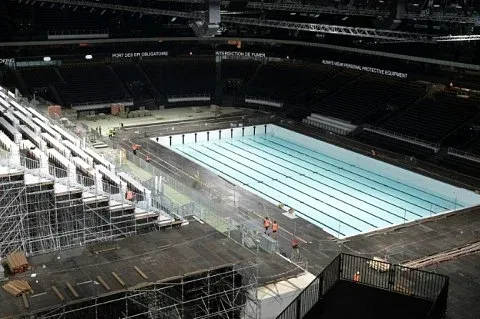The galleries are quiet, and the Olympic Village is starting to empty as athletes depart. With the Paris Olympics concluding yesterday, the question arises: What will happen to the equipment used during the Games? The organizers have a plan in place for that as well.
For decades, the Olympics have been criticized for squandering vast amounts of money, with some stadiums falling into disuse just weeks after the Games. However, Paris aims to break this pattern by employing temporary venues to sidestep construction issues. Additionally, organizers have encouraged equipment suppliers to consider giving their items a 'second life.' They plan to reuse everything from beach volleyball sand to used tennis balls.
In an interview with AFP last week, Paris 2024 sustainability director Georgina Grenon said, 'Before we order anything, we think about what will happen to it later (after the Olympics).'
Such an effort is new in judging a global sporting event. Georgina's team tried to take ideas from FIFA football tournaments and past Olympic events, which could be applied to the Paris Olympics. Then they realized they had to find the way themselves.
'We also hired consultants and no one could tell us they had been done in the past,' explains Georgina. In his group 'Circular Economy' (a process where nothing becomes waste and nature is not harmed).
The first step was to prepare a list of what was needed to host the Olympics, known as the 'Greatest Show on Earth'.
In Georgina's words, 'It's a lot like planning a wedding. Suppose 100 guests come, then you need 10 tables and 100 chairs.' 32 different disciplines were played at the Paris Olympics and the number of spectators was about 1 crore. Georgina said, 'There's about 6 million tools listed, 6 million objects.'
A condition was included in each of the tenders for the procurement of that equipment—the suppliers must provide a plan for how the equipment will be used later. Georgina says, 'We did it because they knew we weren't just buying stuff. They have to figure out what will be the best use of it in the future.'
Many of the equipment and facilities used in the Paris Olympics will be used in the Paralympics. The Paralympics will be held in Paris from August 28 to September 8. But then they will have a new address.
Beach volleyball was held in front of the Eiffel Tower. The fine sand there will be given to a club in Paris. The Paris Olympics logo will be removed from the victory podium, so that it can be used elsewhere. 6 lakh furniture leased from the French company 'Lireco' will be returned and the company will start a 'second hand' furniture business with these furniture.
More than 14,000 mattresses were made from recycled plastic for this year's Olympic Village. They will be given to the French military. The tennis balls used in the tennis event will be donated to sports clubs in France. Other sports such as javelin throw javelin or shot put equipment will also be donated.
Organizers have ensured 90 percent of the 6 million items used are recycled, Georgina said. Fans are also getting a chance to buy these tools as souvenirs. For example, fans can buy and keep the flags that were used during the medal ceremony or the torches that were made for the reel before the start of the games as souvenirs. Two swimming pools, climbing walls and skateboarding parks will also be relocated. They will be redeployed in disadvantaged areas of Paris.
However, even among these, the organizers of the Paris Olympics have to listen to criticism. That is because of the environmental conservation position. This time, the corporate sponsors of the Olympics are steel manufacturer Arcelor and car manufacturer Toyota. They are also being criticized for calling this Olympics 'greenwashing'.
Olympic sponsor Coca-Cola used millions of plastic bottles this time around, even though organizers promised to cut single-use plastic bottles by 50 percent in Paris compared to the 2012 London Olympics.
Environmentalists believe that the Olympics are inherently unsustainable for the environment. This is because huge construction projects and air flights for athletes and spectators cause huge carbon emissions. But Georgina believes the Paris Olympics will change that, 'We've always said we want to turn the Games into a laboratory and we want to go from there.'








.webp)


0 Comments